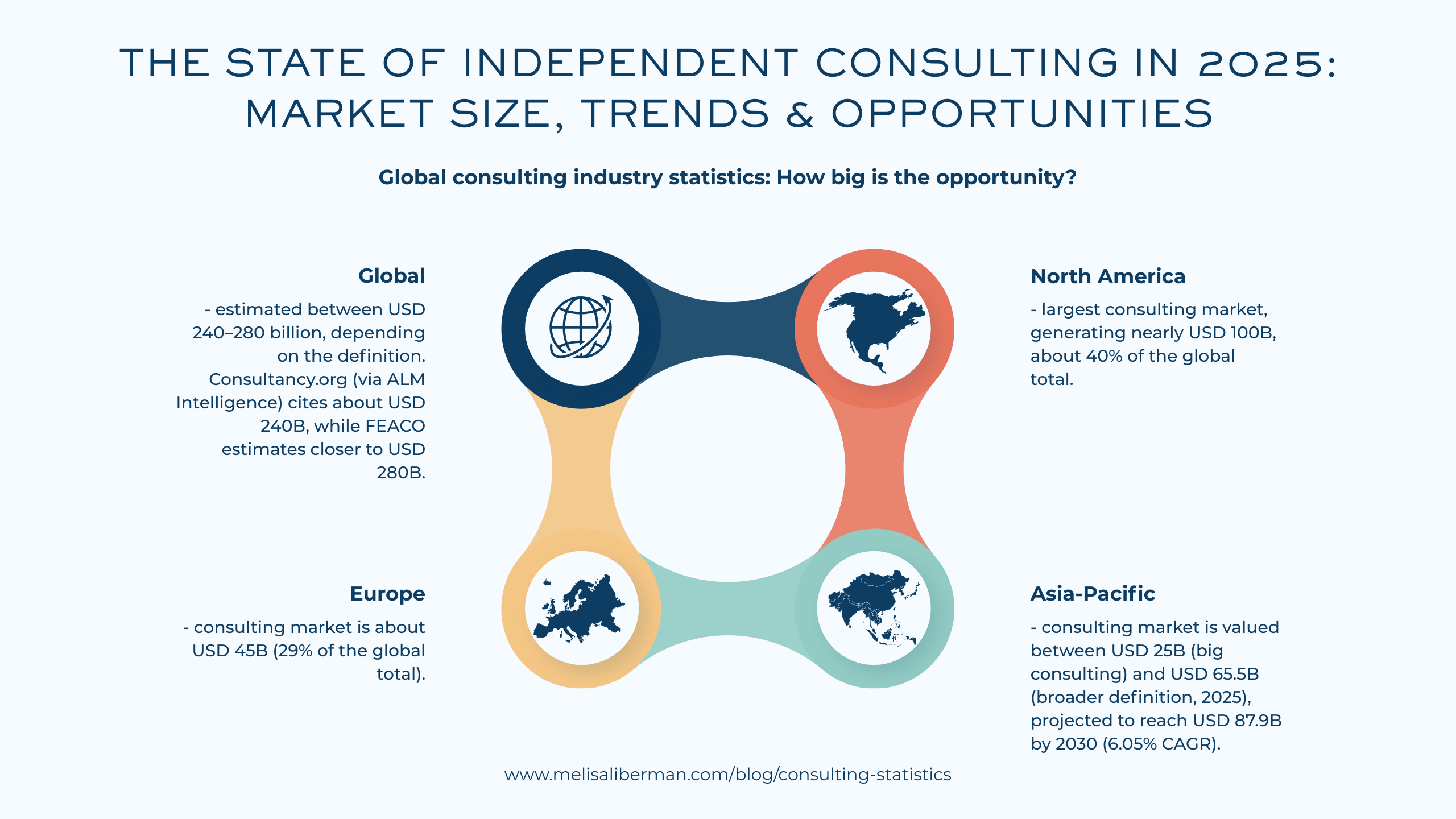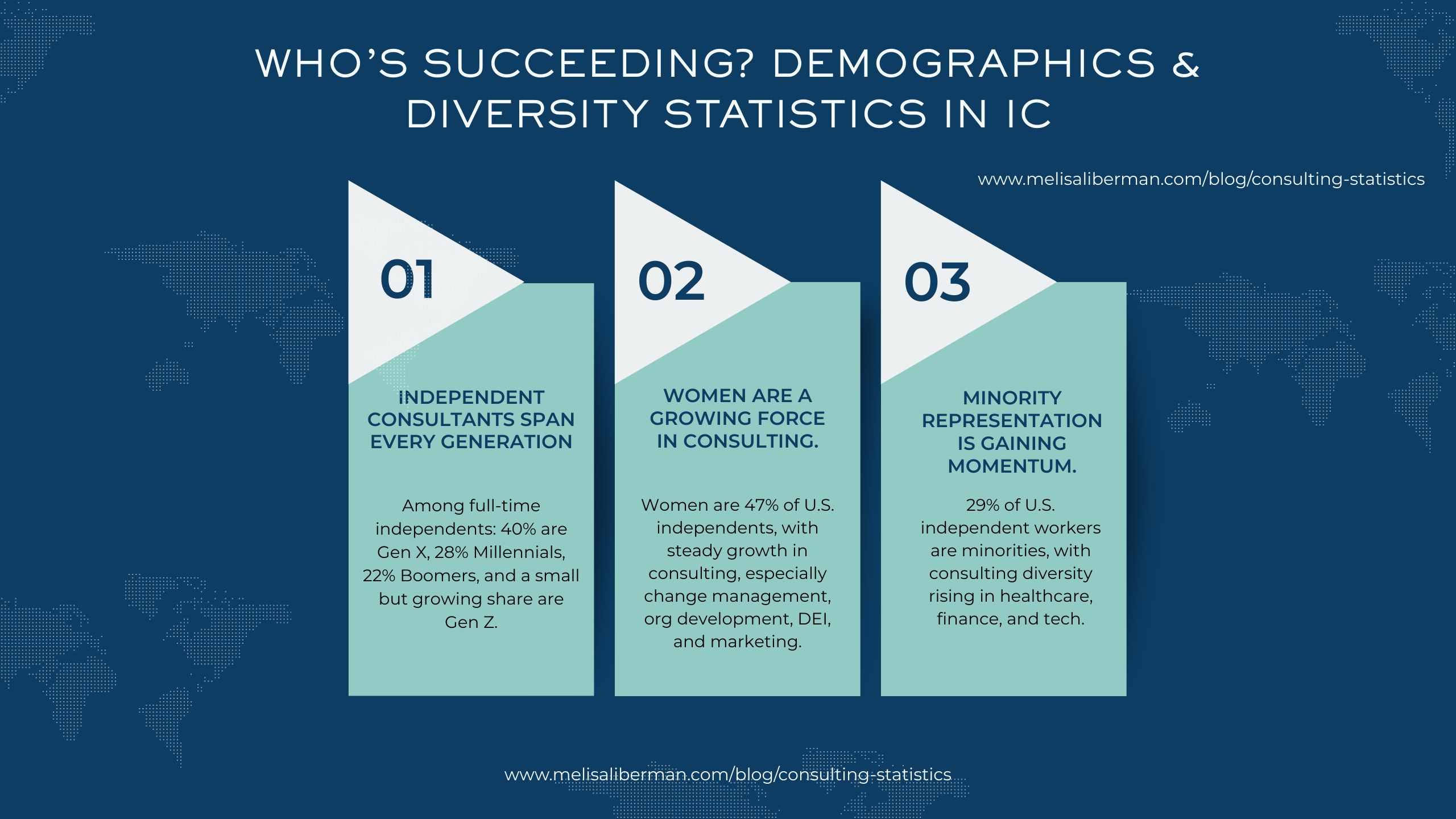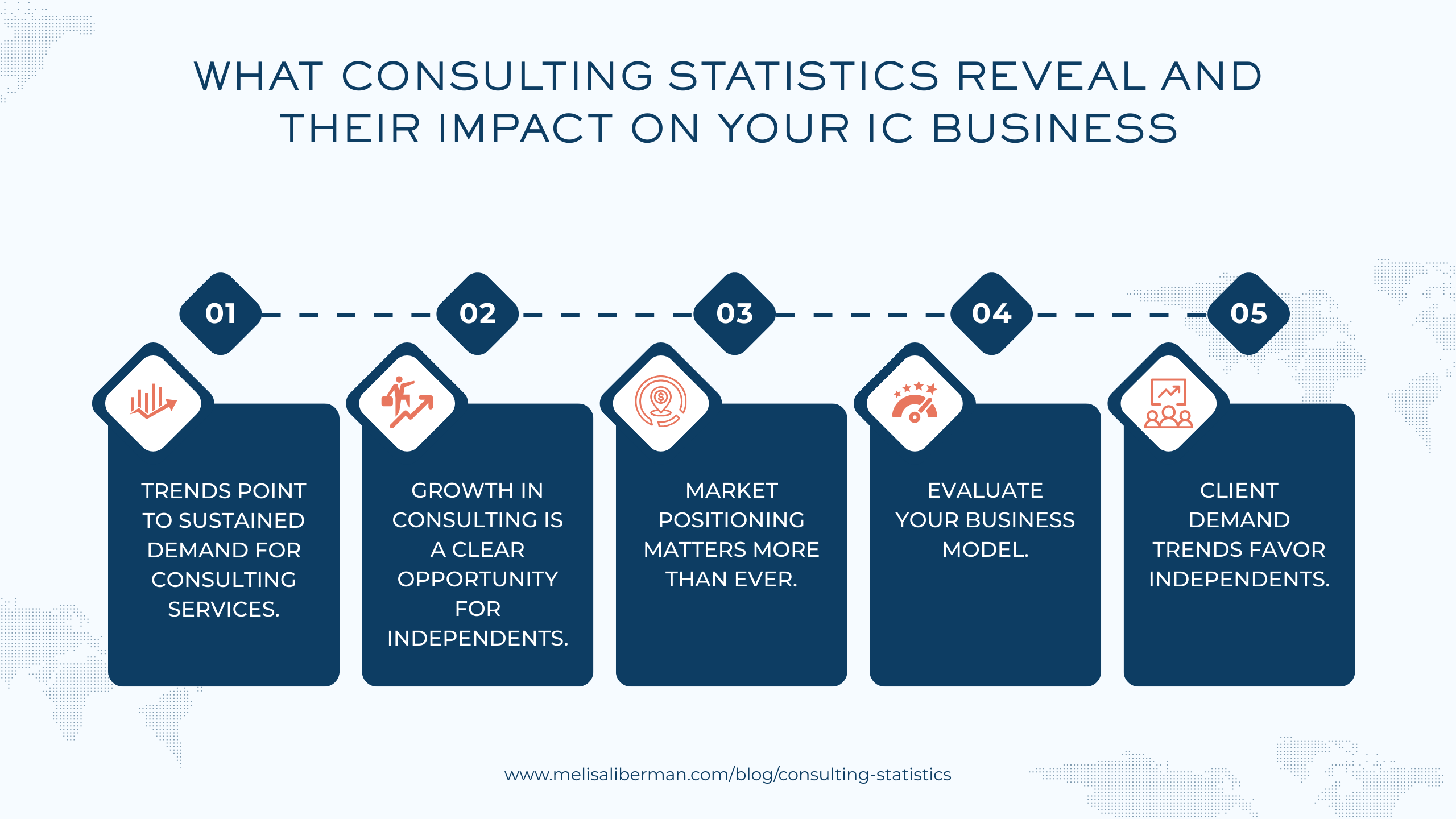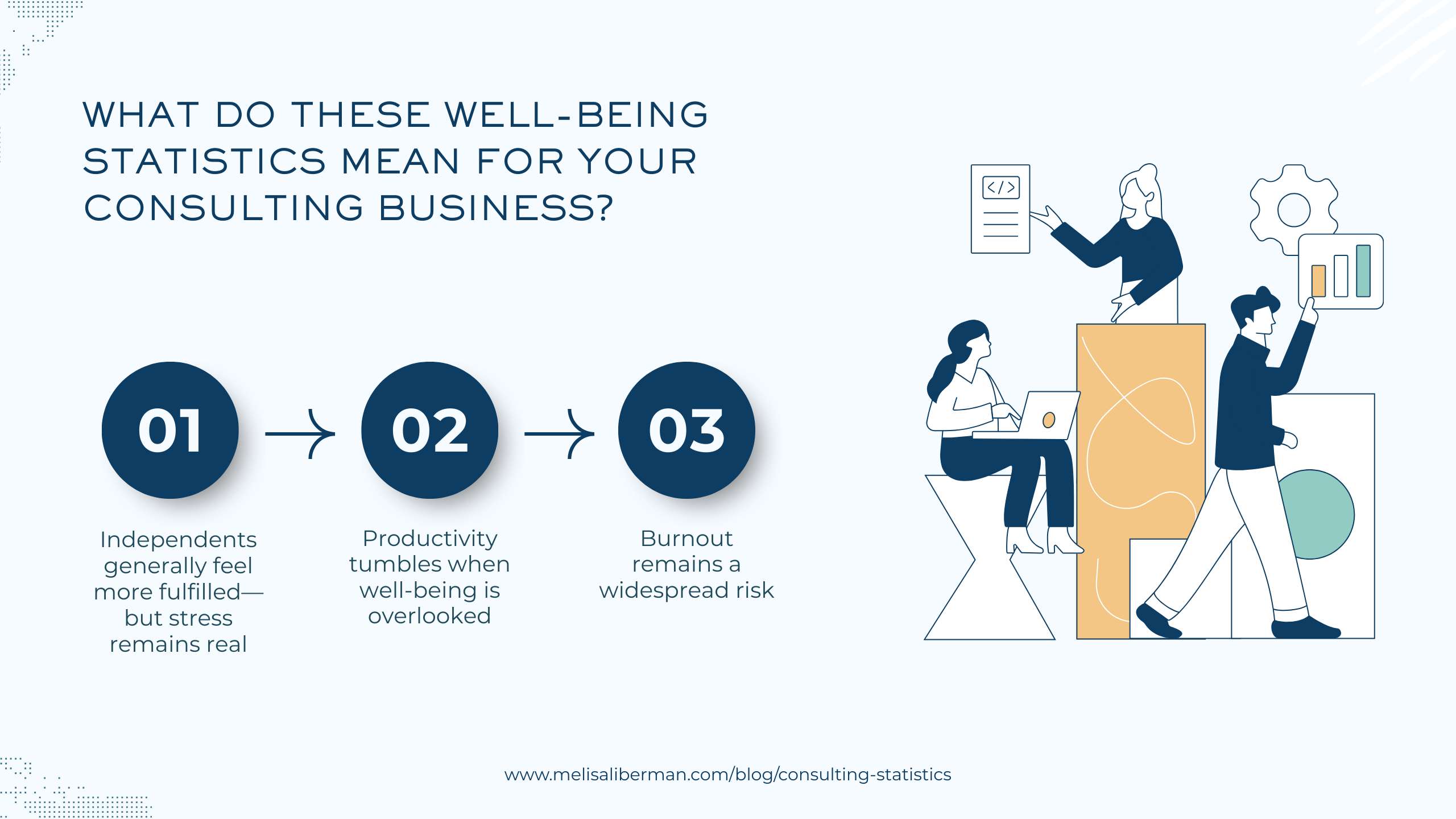Consulting Statistics 2025: Insights for Independent Consultants
Aug 26, 2025
Estimated Reading Time: 16 minutes
Download the article as a PDF:

Table of contents
- Consulting statistics 2025: What every independent consultant needs to know
- The state of independent consulting in 2025: Market size, trends & opportunities
- Independent consulting business statistics: Building a profitable model
- Marketing & business development statistics for independent consultants
- Consulting work-life balance: Well-being statistics every independent consultant should know
- Coaching for consultants: investment, ROI, and success statistics
- How to use these data to build a successful independent consulting business
Why consulting statistics matter more than you think
If you're building (or rebuilding) your independent consulting business, you're not just looking for theory. You want proof. Proof that you're not the only one hitting roadblocks. Proof that success is possible. And ideally, a shortcut to get there faster.
That’s exactly what this article gives you.
We're diving into the consulting statistics that matter. The ones that show what’s working, what’s not, and what that means for you.
You’ll walk away with data-backed clarity on the business growth patterns of successful consultants, the most common challenges independent consultants face, and where to focus your time and energy if you want to hit your goals faster.
Why independent consultants struggle, and how the right data can help
It’s common for independent consultants to fly blind.
They left corporate to gain freedom and control, but find themselves stuck in uncertainty. Inconsistent revenue. Pipeline anxiety. Questioning their pricing. Overworking for underwhelming results.
The problem?
Most of the stats and strategies out there don’t speak to your reality as an independent consultant. They’re designed for firms or agencies, not solo consultants who run a business and serve clients simultaneously.
That’s why this article is different. It’s written for independent consultants like you, the ones wearing every hat and committed to building a business that’s lucrative, sustainable, and fits your life.
Why you can trust this guide
I’m Melisa Liberman. For the past 13+ years, I’ve been an independent consultant. Before that, I worked at Accenture and helped build a start-up to exit, leading the software implementation and product business units.
I began as what I call an “accidental consultant,” taking on random projects, underpricing my work, and questioning whether I was really cut out to be a business owner.
Today, I coach thousands of consultants to build profitable, high-revenue businesses with steady pipelines and pricing that truly reflects the value they deliver.
Everything I share comes directly from client experience and tested strategies. I know what works because I’ve seen it succeed across industries, markets, and business stages.
What you’ll learn in this article: Key consulting statistics for independent success
This isn’t a fluff piece filled with surface-level percentages. It’s a practical breakdown of the numbers that actually matter for independent consultants who want real growth.
You’ll learn:
- Key consulting statistics that explain why so many independent consultants stall out
- The growth metrics that top-earning consultants focus on (and what they ignore)
- Where most consultants waste time (and how to avoid that trap)
- Data-backed strategies that lead to consulting success
Let’s move past generic stats and zero in on the specifics that are relevant to you as an independent consultant.
The state of independent consulting in 2025: Market size, trends & opportunities
If you’ve been wondering whether independent consulting is still a smart business move, the data has a one-word answer: absolutely.
Let’s look at the numbers that matter. These are the kind that help you make decisions like a business owner, not a hopeful contractor.

Global consulting industry statistics: How big is the opportunity?
Before we get into the numbers that matter most for independent consultants, it helps to step back and look at the consulting industry as a whole. The consulting industry isn’t just big; it’s one of the fastest-growing professional services markets in the world.
Understanding the size and direction of the overall market puts your business in context. You’ll see where independents fit, where the opportunities are growing, and why demand continues to expand. Here’s a breakdown of the global market and how it plays out across key regions.
Global
Estimates vary based on how broadly “consulting” is defined. Consultancy.org, citing research from ALM Intelligence, estimates the global management consulting market at around USD 240 billion, while the European Federation of Management Consultancies Associations (FEACO) places it closer to USD 280 billion.
North America
North America remains the largest consulting market worldwide. Its fee income is estimated at just under USD 100 billion, accounting for approximately 40% of the global total (Consulting.us).
Europe
Europe’s consulting industry is valued at around USD 45 billion, representing about 29% of the global market (Consultancy.eu).
Asia-Pacific
The Asia-Pacific consulting market is growing rapidly. Mordor Intelligence estimates the region’s consulting services market at USD 65.5 billion in 2025, with growth to USD 87.9 billion by 2030 at a 6.05% CAGR. Meanwhile, Consultancy.asia reports Source Global Research findings that the Asia-Pacific market represents roughly one-sixth of global consulting, at around USD 25 billion, when measured using a narrower definition of “big consulting.”
Translation: The consulting industry is massive and still expanding, but what matters for you as an independent consultant is how this context translates into opportunity. The growth in every region signals rising demand for expertise, which means more opportunity to win clients and build a profitable business. Understanding where the industry is heading helps you position yourself, price confidently, and see that you’re competing in a growing market rather than a shrinking one.
Key independent consulting statistics: Growth, income & impact
The independent workforce is large and growing. MBO Partners reports that over 7.3 million professionals now work full-time on their own in the U.S., and a significant share of them are consultants.
The data shows why this shift matters. 36% of full-time independents earn more than they did in traditional employment, and nearly 80% say they’re happier working independently than they were in a full-time role.
Independent consultants are also taking on more strategic, high-impact work. According to Business Talent Group, companies increasingly rely on independents to lead transformations, deliver strategic initiatives, and fill leadership gaps, not just to cover short-term resourcing needs.
The takeaway
Independent consulting is not gig work. It’s business ownership, and it’s being taken seriously at the enterprise level.
Who’s succeeding? Demographics & diversity statistics in independent consulting
Let’s talk about the people behind the numbers. Understanding who makes up the independent consulting world can help you see more clearly where you fit, what’s possible, and where the opportunities for leadership and differentiation still exist.

Recent data shows:
Independent consultants span every generation.
According to MBO Partners, 40% of full-time independents are Gen X (ages 43–58), while 28% are Millennials and 22% are Boomers. Gen Z is currently the smallest slice, but that’s changing quickly as career paths diversify earlier.
Women are a growing force in consulting.
Women now represent 47% of the U.S. independent workforce overall (MBO Partners). In consulting specifically, the number of female independents has steadily increased year over year, especially in niches like change management, organizational development, DEI strategy, and marketing advisory.
Minority representation is gaining momentum.
Nearly 29% of independent workers in the U.S. identify as part of a racial or ethnic minority group (MBO Partners). While the consulting space still has ground to make up, there is visible movement in sectors such as healthcare, financial services, and technology.
The takeaway
Independent consulting is becoming more diverse and representative. These shifts point to a future where independents aren’t just participating in the market, they’re increasingly leading the way in shaping the consulting industry itself.
Consulting industry trends statistics in 2025: What’s changing and why
The consulting landscape is rapidly shifting, and it’s great news for independent consultants.
Demand for flexibility and expertise
Companies are leaning on specialized, on-demand talent. Harvard Business Review reports that highly skilled freelancers are in strong demand, requiring firms to rethink engagement models. A joint study from Harvard Business School and BCG found that nearly 700 senior leaders across industries are using digital talent platforms, with 40% reporting measurable gains in speed, productivity, and innovation. The Deloitte 2024 Global Human Capital Trends report also highlights a “boundaryless” workforce where non-traditional talent plays an increasingly critical role.
Boutique is in
Clients are shifting toward smaller, specialized firms for high-value work. The Financial Times and The Times have both covered the rise of boutique consultancies founded by ex–Big Four leaders to compete directly with incumbents. Business Insider notes that AI-driven boutiques are winning market share from McKinsey, BCG, and Deloitte by delivering faster, more specialized, and more cost-effective services. Source Global Research reinforces this shift, reporting that clients are prioritizing targeted, specialist providers over one-stop shops.
Consulting growth remains strong
The U.S. consulting market is projected to grow at 8%+ CAGR through 2025, driven by innovation, technology disruption, and evolving workforce preferences (IBISWorld).
The takeaway
Have you been hesitant to believe that ideal clients will engage you as an independent? It’s time to rethink. The market proves otherwise. Independent consulting is a serious business model, and clients are buying in at scale. For more on where the industry is heading, see my full article on consulting trends that should be on your radar in 2025.
What consulting statistics reveal, and what it means for your independent consulting business
When you look at the consulting industry data and trends, a few clear insights emerge for independent consultants.

Trends point to sustained demand for consulting services.
The global market continues to expand, with strategic consulting and digital transformation driving much of the growth. This tells us that consulting is not cyclical “gig work” but a long-term, high-value industry where clients invest even during times of uncertainty.
Growth in consulting is a clear opportunity for independents.
Companies are prioritizing expertise in areas like transformation, technology adoption, and workforce change. For independent consultants, this creates a clear opportunity to align your services with the same strategic priorities fueling industry growth.
Market positioning matters more than ever.
Clients are deliberately choosing smaller firms and independent consultants for their agility, specialization, and cost-effectiveness. The takeaway: it’s not enough to “be available.” You need a strong positioning strategy that communicates why clients should choose you over both large firms and other independents.
Evaluate your business model.
With client demand shifting, independents who build repeatable offers, price confidently, and focus on their niche will capture more of this growth. Ask yourself whether your business model is built for repeatability and predictability, or whether it still looks like a collection of short-term projects.
Client demand trends favor independents.
Across industries, clients are buying independent consulting at scale, not just to fill gaps but to lead transformations and execute high-impact initiatives. This confirms that independent consulting is being taken seriously at the enterprise level, and the opportunities will only grow.
The takeaway
The numbers don’t just show that consulting is a massive industry. They highlight that independents are already playing a pivotal role in its growth. The more intentional you are about aligning your business model and positioning with these trends, the more you’ll benefit from the momentum.
Reflection questions:
- How well does your current positioning align with what clients are actively buying?
- Are your services framed as high-value, strategic solutions or as tactical project support?
- Is your business model structured for predictable growth, or are you still piecing together short-term projects?
- What one adjustment would help you better capture the demand revealed in this data?
Independent consulting business statistics: Building a profitable model
Independent consulting is a fast-growing part of the broader professional services industry. The rise of self-employment trends, shifting workforce preferences, and client demand for flexibility have pushed independent consulting into the mainstream.
Today, millions of professionals are building consulting businesses outside of traditional firms. They’re creating business models that generate consistent income, competing with larger firms, and proving that solo consultants can succeed at the highest levels. From firm size data to income benchmarks, these statistics highlight what’s possible when you operate as a business owner rather than a contractor or freelancer.
Independent consultant rates and pricing statistics: what independent consultants are charging
What should you charge? How do your rates compare to others in the market? Which pricing models position you best for income and long-term client relationships? The right consulting fee structure signals expertise and drives profitability. In 2025, senior independents with the right strategy continue to command premium rates.
Consulting hourly rates
Independent consultants with deep expertise often charge between $200 and $1,000+ per hour, depending on niche and complexity. Expert networks validate this range: mid-level experts typically charge $100–$300/hr, senior subject-matter specialists often hit $300–$500/hr, and C-level or elite advisors reach $500–$1,000+ per hour, especially for urgent, high-value work. (Silverlight Research, GrowthMentor)
Retainer consulting fees
Retainers remain one of the most effective structures for predictable revenue and premium positioning. High-impact consultants commonly charge $5,000 to $20,000+ per month, based on deliverables and seniority. For practical frameworks and pricing templates, see my Independent Consultant Rates and Retainer Fees Guide.
Average consulting rates and income trends
Broader MBO Partners data confirms income potential for successful independents. In 2024, the number of independent contractors earning over $100,000 annually reached 4.7 million—a significant increase from 3 million in 2020. Full-time independent workers grew by 6.5% to 27.7 million, demonstrating both scale and upward earnings mobility. (MBO Partners, 2024 State of Independence Report).
Consultant pricing strategy
How you price is as important as what you charge. Hourly billing can cap earnings and position you as a contractor. In contrast, project-based and value-based pricing align your fees with outcomes—boosting profitability and client trust. A balanced strategy uses hourly when needed, but leans heavily on retainers and value-based engagements for strategic, long-term work.
For a step-by-step breakdown of these approaches, check out my Independent Consultant Rates and Retainer Fees Guide.
The bottom line
The 2025 consulting marketplace favors premium positioning. If you're still quoting hourly by default, you may be leaving both value and revenue on the table. Independent consultants who package offers, use retainers, and price based on outcomes consistently out-earn peers relying solely on hourly billing.
What do these business statistics mean for your consulting business?
The numbers are not just interesting. They are a roadmap for how you can grow.
If consulting demand and rates are rising, the opportunity for you is revenue optimization. That does not necessarily mean taking on more projects. It means examining your pricing strategy and aligning it with the value you create.
Too many consultants default to hourly billing, which limits profitability and positions them as contractors. Shifting toward value-based pricing and retainers ties your income to client outcomes instead of hours worked. This not only boosts your earnings but also strengthens client relationships by making your success directly tied to theirs.
From a financial planning perspective, recurring revenue through retainers gives you stability, while premium project fees provide leverage and scale. With the right mix, you create a model that supports both short-term cash flow and long-term consulting profitability.
The bottom line: the data shows a strong market. Your job is to ensure your pricing structure and business model allow you to fully benefit from it.
Marketing & business development statistics for independent consultants
For independent consultants, consistent marketing and business development are the lifelines of growth. Recent research shows that over 70% of consultants rely heavily on referrals as their primary source of work. While referrals are valuable, they are unpredictable and make it harder to build a sustainable business.
The study also found that fewer than 30% of consultants consistently execute a formal marketing strategy. This leaves a wide-open opportunity for independents who commit to repeatable outreach systems. Consultants who invest in content marketing, speaking engagements, and thought leadership report stronger inbound lead flow and more leverage in sales conversations.
When it comes to channels, the data points to a clear pattern:
- LinkedIn networking and content were rated as the most effective source of new leads.
- Email outreach came in close behind, especially for consultants using targeted, value-driven campaigns.
- Partnerships and alliances provided a strong secondary channel, particularly for consultants who specialize.
- Referrals remain common but were ranked lower in terms of reliability and predictability.
The data underscores the importance of mastering the consulting sales funnel. Consultants who track prospects through a defined pipeline—rather than treating every interaction as one-off—close deals faster and with less resistance. Structured follow-up and clear conversion steps make the difference between a sporadic client base and a sustainable one.
The takeaway: you cannot depend on hope or word-of-mouth alone. A strong lead generation system is non-negotiable. Start by exploring proven approaches in my guides on marketing for consultants and consulting lead generation.
What do these marketing statistics mean for your consulting business?
The takeaway is clear: even in a reputation-driven, relationship-based consulting business, marketing isn’t optional if you want a steady pipeline of high-quality clients. Marketing, in this context, means being intentional about how you show up and how your expertise is seen by the right people.
Consultants who invest in visibility and positioning spend less time scrambling for the next project and more time in qualified, productive sales conversations. When your marketing builds trust, prospects often come into the first call already viewing you as a strategic partner. From there, a straightforward sales process helps turn those warm relationships into revenue.
For your consulting business, the implication is simple: treat marketing as a driver of credibility and consistent opportunities, not an afterthought. Sharpen your targeting, focus on the select places where your buyers actually engage, and measure ROI by the quality of opportunities you create. Done right, your marketing becomes a system that keeps your pipeline warm, strengthens your reputation, and supports profitability.
Consulting work-life balance: Well-being statistics every independent consultant should know
One of the biggest draws of independent consulting is the promise of greater control over your time. But statistics consistently show that work-life balance remains a challenge, even outside the walls of big firms.
Research from MBO Partners highlights that while 76% of independent professionals report high satisfaction with their career choice, nearly half still cite stress and inconsistent workload as ongoing concerns. Other studies, such as Deloitte’s survey on workplace well-being, show that consultants are particularly at risk of burnout when client demands escalate or boundaries aren’t in place.
For independents, the implications are clear: well-being isn’t just personal, it’s a business issue. Burnout reduces your ability to deliver at the level clients expect and can quietly erode profitability. On the flip side, consultants who proactively manage capacity, set clear boundaries, and prioritize mental health are more likely to sustain long-term success and client satisfaction.
Practical steps include tracking utilization so you don’t overcommit, creating non-negotiable downtime, and building in recovery periods after demanding projects. Treating your well-being as a core part of your consulting model strengthens both your business longevity and the results you deliver for clients.

What do these well-being statistics mean for your consulting business?
Well-being data highlights a fundamental point: your business is only as sustainable as your well-being. Your mental health and work-life balance directly impact your productivity, client delivery, and long-term viability as a consultant.
Here’s what the numbers show, along with powerful implications for your business:
1. Independents generally feel more fulfilled—but stress remains real
According to the 2023 Life Goals Report from MBO Partners, independent professionals outperform traditional employees when it comes to hitting key life goals like spending time with family (63% vs. 55%), leading a fulfilling life, and personal growth. But that doesn’t mean they’re stress-free; many still report irregular workloads and pressure around client demands.
Implication: Enjoying flexibility and fulfillment doesn’t eliminate stress. Intentional well-being strategy, not just workload control, ensures you sustain what drew you to independent work in the first place.
2. Productivity tumbles when well-being is overlooked
Research from Gallup shows that organizations prioritizing mental health see 13% higher productivity, and employees are 2.3 times less likely to report feeling stressed.
Implication: Prioritizing your mental health isn’t an indulgence, it’s smart business. Treat well-being like you would any operational metric, because your productivity depends on it.
3. Burnout remains a widespread risk
A global leadership report from DDI found that 71% of leaders say stress has significantly increased in their current role. This is a red flag for independents: without protection and balance, our high-capacity roles can lead straight to overextension.
Implication: Protect your capacity with strategic boundaries because continued performance depends on your resilience, not just your reputation.
|
Focus Area |
Why It Matters |
|
Business sustainability |
Your health underpins your business; it’s your core asset, not a luxury. |
|
Lifestyle design |
Shape your schedule around recovery and meaningful engagement, not nonstop delivery. |
|
Well-being strategy |
Treat mental health as part of your operating model, not an afterthought. |
|
Productivity & planning |
Sustainable energy lets you serve clients better, while fueling consistent pipeline growth. |
|
Long-term success |
Your vision isn’t just performance, it’s longevity and impact on your terms. |
Coaching for consultants: investment, ROI, and success statistics
For independent consultants, coaching isn’t just about personal growth; it’s a business investment that directly impacts revenue, sustainability, and long-term success.
According to the International Coaching Federation, 86% of companies report that they recouped their investment in coaching, and many saw returns far exceeding the initial spend. The data also shows measurable improvements in work performance, business management, time management, and team effectiveness.
For consultants specifically, the ROI of coaching goes beyond skills; it’s about building a sustainable, growth-focused business. Coaching provides a structure for professional development and accountability that many independents lack when working on their own. With the right mentor, you can:
- Strengthen your positioning and pricing confidence
- Optimize your business model for profitability
- Build repeatable systems for lead generation and sales
- Manage stress and workload to prevent burnout
- Shorten the trial-and-error cycle by learning proven strategies
In other words, coaching helps you accelerate results you may otherwise spend years trying to achieve alone.
If you’re considering whether coaching is worth the investment, think of it as building leverage into your business. The time and money you put in now pays back in increased revenue, stronger client relationships, and long-term confidence in running your business.
For more details, visit Coaching for Consultants to see how targeted coaching can transform your consulting business.
How to use these data to build a successful independent consulting business
Data on pricing, marketing, well-being, and coaching all point to the same conclusion: running a profitable consulting business isn’t about working harder—it’s about being intentional. The most successful independent consultants treat their business like a business, not a side project. They set premium pricing strategies, build visibility with the right audience, protect their energy and time, and invest in coaching to accelerate results.
This is exactly what the IC-Grow™️Program is designed to help you do. Inside the program, you’ll learn how to:
- Confidently set and raise your rates so you stop leaving money on the table
- Build a steady, predictable pipeline of clients without relying on referrals alone
- Strengthen your positioning so prospects see you as the go-to expert before the first sales call
- Create a sustainable way of working that supports your lifestyle and long-term goals
- Implement the systems, mindset, and accountability you need to scale consistently
If you’re ready to move beyond trial-and-error and build a consulting business that’s profitable, predictable, and fulfilling, the next step is simple:
Book a consultation or learn more about coaching for consultants.




